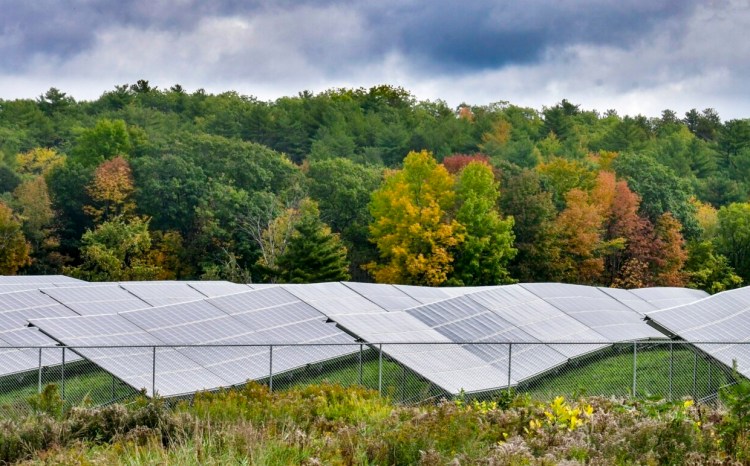AUGUSTA — The Planning Board has unanimously approved changes meant to make large solar farms in Augusta less visible and more pleasing aesthetically.
The approval came despite concerns from a state senator and real estate agent that the lack of a cap on the number or size of solar farms could result in a lack of developable land for other uses, such as housing.
The proposed changes are only recommendations to the City Council, which must vote on whether to adopt them.
Approved Tuesday, the changes were made to address concerns about aesthetics that came up after a solar farm was installed off Church Hill Road and, city councilors said, prompted residents to contact them with their concerns about its appearance, both from Church Hill Road and Route 3, a major gateway into the city.
In response, City Councilors enacted a 180-day moratorium in August on large — more than 15,000 square feet — solar farm development, and directed staff members and the Planning Board to work on changes to up the requirements for visual screening.
The changes include requirements that plants and trees be added around large solar development projects to better screen them from view.
The changes drew praise from officials of two major solar development firms with major projects in Maine, including Augusta.
“We believe these are prudent industry standards being incorporated into the ordinance,” said Nick Mazuroski, co-founder of Dirigo Solar in Portland. “We recognize changes needed to be made, and are happy to comply with these and, really, take no issues with any of them.”
However, state Sen. Matt Pouliot, R-Augusta, a real estate agent, said the ordinance changes should have included a cap on the number of solar projects or on the amount of acreage to be taken up by them in the city.
Pouliot expressed concern there is not a lot of developable land in the city, and if solar farms are allowed to occupy too much space, it will not leave much for other types of development.
“My concern is if we take too much of an ad hoc approach to siting solar farms, we’re going to shoot ourselves in the foot as it relates to having land to build affordable housing, middle-class housing for people and potential commercial real estate development, all of which could have the potential to bring more people to our community to live here and work here,” Pouliot said.
“I’m not opposed to any of these projects at all, but think we need to have a more thorough discussion about where we’d like to see solar, just like we’ve had discussions about where we want industrial uses in our community, where we want rooming houses in our community, about where we want restaurants and more.”
Planning Board members said they discussed that issue at a previous board meeting and concluded most solar developments tend to be in areas of the city without public utilities, including sewer and water, which are less likely to work for affordable housing projects.
They also said if so much solar development takes place or is proposed in Augusta that officials become concerned it is taking land away from more desirable uses, another moratorium could be put into place to consider changes, which could include a cap on the number or size of solar projects.
Planning Board member Delaine Nye said the city’s land use ordinance already regulates where solar farms can be developed, based on the size of the project.
“It is very clear where solar farming is zoned to go,” Nye said. “It’s my feeling we’re in a situation in this country right now we can’t just wait 20 years to do things that will provide clean energy. We have to do something now. For Augusta to be known as the solar capital of Maine is not a bad thing to be known for. A lot better than being known as the big box capital of Maine.
“These solar farms, they’re tax generators. So we’re seeing increased tax revenue now. We’re seeing land used now. We’re seeing benefits to climate change now. And if at any point there seems to be excess development of land for the use of solar energy, a new moratorium can be put on future development.”
Ward 3 City Councilor Mike Michaud said councilors have heard from solar developers who have projects pending in Augusta that have been held up by the moratorium. The developers have said they need to move ahead with their projects, so Michaud said he expected councilors to consider action soon on the proposed changes.
Augusta Development Director Matt Nazar said he expected city councilors could take up the issue at their Oct. 14 informational meeting, which would be followed by a business meeting at which there would be a public hearing on the matter and councilors could vote to adopt the changes and end the moratorium.
Before Planning Board members approved the changes Tuesday, they agreed, at the suggestion of Nate Niles, director of development for ReVision Energy, to increase — from 90 to 180 days — the time allowed for firms to decommission solar farms after they are no longer being used.
Niles said Maine’s seasons, including mud season, could make it difficult to remove all of the equipment from some solar developments in just 90 days.
Copy the Story LinkSend questions/comments to the editors.




Success. Please wait for the page to reload. If the page does not reload within 5 seconds, please refresh the page.
Enter your email and password to access comments.
Hi, to comment on stories you must . This profile is in addition to your subscription and website login.
Already have a commenting profile? .
Invalid username/password.
Please check your email to confirm and complete your registration.
Only subscribers are eligible to post comments. Please subscribe or login first for digital access. Here’s why.
Use the form below to reset your password. When you've submitted your account email, we will send an email with a reset code.